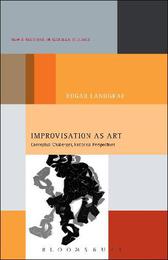
|
Improvisation as Art: Conceptual Challenges, Historical Perspectives
Paperback / softback
Main Details
| Title |
Improvisation as Art: Conceptual Challenges, Historical Perspectives
|
| Authors and Contributors |
By (author) Dr. Edgar Landgraf
|
| Series | New Directions in German Studies |
|---|
| Physical Properties |
| Format:Paperback / softback | | Pages:176 | | Dimensions(mm): Height 216,Width 140 |
|
| Category/Genre | Literary studies - c 1500 to c 1800
Literary studies - c 1800 to c 1900 |
|---|
| ISBN/Barcode |
9781628929577
|
| Classifications | Dewey:830.9006 |
|---|
| Audience | | Tertiary Education (US: College) | | Professional & Vocational | |
|---|
|
Publishing Details |
| Publisher |
Bloomsbury Publishing Plc
|
| Imprint |
Bloomsbury Academic USA
|
| Publication Date |
29 May 2014 |
| Publication Country |
United States
|
Description
Improvisation as Art traces how modernity's emphasis on inventiveness has changed the meaning of improvisation; and how the ideals and laws that led improvisation to be banned from "high art" in the eighteenth century simultaneously enabled the inventive reintegration of improvisation into modernism. After an in-depth exploration of contemporary theoretical contentions surrounding improvisation, Landgraf examines how the new emphasis on inventiveness affects the understanding of improvisation in the emerging aesthetic and anthropological discourses of the late 18th and early 19th centuries. He first focuses on accounts of improvisational performances by Moritz, Goethe, and Fernow and reads them alongside the aesthetics of autonomy as it develops at the same time. In its second half, the book investigates how the problem of "planning" art receives a different treatment in German Romanticism. The final chapter focuses on the writings of Heinrich von Kleist where improvisation presents a central aesthetic principle. Kleist's figurations of improvisation recognize the anthropological predicament of the self in modern society and the social constraints that invite and often force individuals to improvise.
Author Biography
Edgar Landgraf is Associate Professor of German in the Department of German, Russian, and East Asian Languages at Bowling Green State University, USA.
Reviews"Landgraf writes with refreshing clarity, showing how neocybernetics-systems theory in the line from Heinz von Foerster to Niklas Luhmann-offers concepts that resolve prior impasses in theoretical approaches to improvisation. His nuanced treatments of Derrida and Luhmann on modernity and invention rival Cary Wolfe's seminal work at this important intersection. Landgraf's itinerary modulates effectively from keen textual detail to broad historical and aesthetic matters. Establishing links from German Romantic practice to classical, premodern, modernist, and postmodernist artistic forms, Improvisation as Art develops a superbly coherent and persuasive argument, well positioned in the midst of significant and timely critical debates." -- Bruce Clarke, Professor of Literature and Science, Texas Tech University, USA, and co-editor of The Routledge Companion to Literature and Science. "Edgar Landgraf's Improvisation as Art marks a genuine intellectual breakthrough. It not only unfolds a highly original account of the emergence of aesthetic autonomy around 1800, but also recasts the terms of the ongoing effort to conceptualize artistic improvisation. Without a trace of tendentiousness, Landgraf develops a "neocybernetic" critique of major theoretical positions (e.g., Butler, Derrida) and introduces the reader along the way to a flexible methodology of cultural analysis. Historical erudition, intellectual agility, and commitment to clarity are the salient features of Landgraf's scholarly voice. His book is an abundant conceptual resource to which readers will often return." -- David E. Wellbery, LeRoy T. and Margaret Deffenbaugh Carlson University Professor, Department of Germanic Studies, University of Chicago, USA "Both students and scholars of 18th and early 19th-century German literature, as well as anyone interested in modern notions of art and improvisation will benefit highly from this erudite and clearly written study, which expands on Luhmann's descriptive and avowedly value-free, sociological theory of art and makes it accessible to a wider audience. By including in the discussion also an opponent of systems theory, Jacques Derrida, who insisted on the 'incalculability of the incalculable' and on openness for the advent of 'the other' (19-29),Landgraf contributes to current debates on ideas of freedom and the role of art and/asimprovisation in society, inviting our participation." - German Quarterly (Winter 2012, reviewed by May Mergenthaler, The Ohio State University) Both students and scholars of 18th and early 19th-century German literature, as well as anyone interested in modern notions of art and improvisation will benefit highly from this erudite and clearly written study, which expands on Luhmann's descriptive and avowedly value-free, sociological theory of art and makes it accessible to a wider audience. By including in the discussion also an opponent of systems theory, Jacques Derrida, who insisted on the 'incalculability of the incalculable' and on openness for the advent of 'the other' (19-29), Landgraf contributes to current debates on ideas of freedom and the role of art and/as improvisation in society, inviting our participation. -- German Quarterly
|